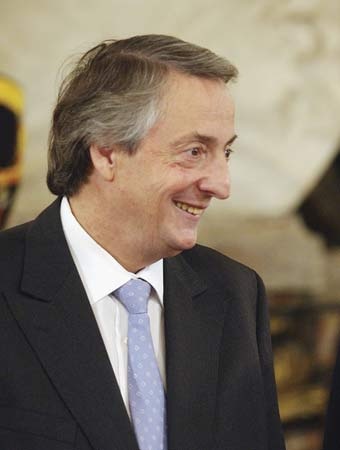Kirchner, Néstor
president of Argentina
in full Néstor Carlos Kirchner
born Feb. 25, 1950, Río Gallegos, Santa Cruz, Arg.
 Argentine lawyer and politician, who was president of Argentina from 2003 to 2007.
Argentine lawyer and politician, who was president of Argentina from 2003 to 2007.Kirchner studied law at the National University of La Plata, where he was a member of the Peronist Youth organization. In 1975 he married Cristina Fernández, a fellow law student. Following their graduation in 1976, the couple returned to Santa Cruz, where they established a successful law practice in the late 1970s. During the country's military dictatorship (1976–83), Kirchner was briefly imprisoned for his political beliefs. In 1987 he was elected mayor of Río Gallegos, and in 1991 he was elected to the first of three consecutive four-year terms as governor of Santa Cruz. The considerable oil reserves in Santa Cruz, combined with the province's small population, allowed Kirchner a measure of independence from the national government. He was also frequently critical of the administration of Pres. Carlos Menem (Menem, Carlos). Like her husband, Cristina Fernández de Kirchner (Fernández de Kirchner, Cristina) became a powerful political figure in Santa Cruz, and in 2001 she was elected to the national Senate.
Largely unknown outside his home province, Kirchner decided to seek the presidency in 2003. Although at first his candidacy was not taken seriously by most observers, he ran a skillful campaign and received the strong endorsement of outgoing Pres. Eduardo Duhalde, who was a key figure in the Peronist party (formally the Justicialist Party 【Partido Justicialista; PJ】). In the first round of voting in April 2003, he finished a close second to former president Menem. Shortly before the scheduled runoff, however, Menem—trailing Kirchner by a wide margin in opinion polls—withdrew his candidacy, and Kirchner became president-elect by default. A week later Kirchner was sworn in as president.
Once in office, Kirchner consolidated his power by taking actions that were popular with the general public. He forced top military officials to retire, annulled legislation prohibiting the extradition of military officers accused of human rights abuses (dating to the 1976–83 military dictatorship), and attacked unpopular institutions such as the Supreme Court and the privately run utility companies. In September 2003 he helped negotiate a debt-restructuring deal with the International Monetary Fund (IMF) after the country defaulted on a $2.9 billion loan.
Kirchner's economic policies—including his decision to devalue the Argentine peso—brought economic growth, and in legislative elections in October 2005 his faction of the Peronist party gained strength in both houses of the legislature. In one closely watched Senate race in Buenos Aires province, Kirchner's wife easily defeated the wife of former president Duhalde (with whom Kirchner was having a leadership struggle), confirming Kirchner's emergence as the undisputed leader of the Peronists. In December 2005 Kirchner ordered the treasury to repay Argentina's nearly $10 billion debt to the IMF, a small but significant symbolic gesture showing that Kirchner was moving Argentina away from reliance on the IMF and attempting to forge alliances with other populist leaders in Latin America. Despite Kirchner's popularity and his success in reviving Argentina's economy, during his last year in office his administration was tainted by corruption scandals, an energy crisis, and high inflation. Kirchner chose not to seek a second presidential term and announced his support for Sen. Cristina Fernández de Kirchner (Fernández de Kirchner, Cristina) as the Peronist party presidential candidate in the 2007 elections. She won the election by a significant margin to become Argentina's first elected female president. In April 2008 Néstor Kirchner became the new leader of the Peronist party.
- displacement
- displacement activity
- displacement current
- displacement law
- display behaviour
- disposable income
- Disraeli, Benjamin, Earl Of Beaconsfield, Viscount Hughenden Of Hughenden
- dissociation
- dissociative identity disorder
- distance learning
- distance-measuring equipment
- Di Stefano, Alfredo
- distillation
- distilled spirit
- Distinguished Service Order
- distortion
- distress
- distress signal
- distributed computing
- distribution
- distribution function
- Distribution of the world's forest land
- distribution of wealth and income
- distribution theory
- distributive law